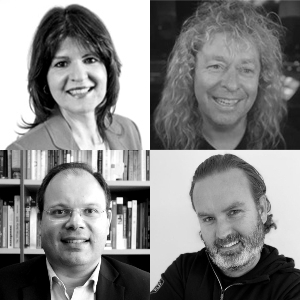As an animator, most of Dr Drew Berry’s days are spent reading scientific literature and going on long walks to think about what he reads while his computer runs tasks. There is a great deal of data on cellular processes, however the full story is often scattered among multiple studies and papers (i.e. all the details of one machine complex may be comprised of multiple proteins that work together, and each is described individually). Dr Berry therefore has to piece the jigsaw puzzle together to show the big picture while keeping the smaller details accurate. He also has to make artistic choices that may not always reflect the science of what’s going on. Colour is not relevant at the cellular and molecular levels; but he uses it in his animations to evoke moods and emotions, allowing him to better engage his audiences and also make it easier to distinguish between different components and processes of a cell.
Prizes across four categories of science are available to doctoral candidates who are in the final year of their PhD (or equivalent). Thanks to the generosity of Dr Max and Mrs Margaret Richards, the value of our four first prizes are now valued at $1250 each. With an opportunity to present your research work to Victoria’s oldest learned society, you should start planning your application today!
Finalists will present to the Society during National Science Week, on the evening of Thursday, 16 August 2018.
The RSV is delighted to be partnering with the Commonwealth and Victorian Governments to deliver a new Inspiring Australia program, engaging our state’s communities in the excitement and opportunities of advances in Science, Technology, Engineering and Mathematics (STEM).
The partnership will connect everyday Victorians with STEM by demonstrating how these skills improve our knowledge of the world around us, inform better decision making, business efficiency and solve some of our greatest everyday challenges.
We are absolutely delighted to welcome Simon Torok and Paul Holper of science communication agency Scientell to the Society’s historic building.
Simon and Paul are seasoned science communicators, writers, editors, marketers, media strategists and business developers. They have acquired extensive experience as program managers and communications specialists with CSIRO over many years.
Scientell recently won the 2016-17 Monash Business Award in the “Micro Business” category in recognition of their significant achievements and innovations, which includes one of their pieces being included in The Best Australian Science Writing 2017 – in some very fine company indeed.
Review by by Helen Gardiner van de Pol
As science communicators, we are always being asked to evaluate our activities and demonstrate impact. Teachers know this well. How do you know which part of what program helped form the adult you see before you today? That science outreach event you planned for 8-9-year-olds some 20 years ago, did it impact those children as intended? Did it contribute to their later decision to choose a career in science? Did it make them more scientifically literate even though they grew up to do art? If we interviewed them today, would they correctly recall your wonderful program and describe how it changed their life or would it just be part of a fog of memories which included fun trips to the museum with their favourite aunt who was a scientist?









